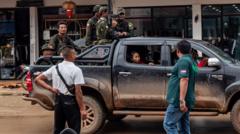Shwe Kokko, a burgeoning city in Myanmar, is marked by modern architecture and ambitious visions, yet its reputation as a hub for scams and human trafficking persists, fueled by a backdrop of war and lawlessness.**
Shwe Kokko: A Mirage of Prosperity in a Scandalous Landscape**

Shwe Kokko: A Mirage of Prosperity in a Scandalous Landscape**
A deeper look into Shwe Kokko, a controversial city in Myanmar notorious for scams and illicit activities, revealing the juxtaposition between its shiny facade and the dark realities beneath.**
The shimmering buildings of Shwe Kokko rise unexpectedly from the sprawling fields of Myanmar's Karen State, a scene that challenges reality itself. This city, constructed over the last eight years, is marked by a striking paradox: it seeks to present itself as a luxurious haven, yet it is widely known for its connections to fraudulent activities, money laundering, and human trafficking.
At the heart of this urban development is entrepreneur She Zhijiang, currently imprisoned in Bangkok while awaiting extradition to China. His organization, Yatai, promotes Shwe Kokko as a tranquil resort for affluent Chinese tourists, despite growing allegations of criminal activities underpinning its economy.
Shwe Kokko emerged amid the tumultuous backdrop of a civil war and severe poverty, which once characterized this region. With promises of development and prosperity tied to Beijing's Belt-and-Road Initiative, She Zhijiang's vision was almost cinematic. However, the reality has proven more sinister, as narratives of exploitation persist.
A visit to Shwe Kokko reveals a carefully curated environment. Upon entering, visitors encounter newly constructed streets, villas, and billboards proclaiming a break from scams and forced labor. Yet, the locals—mostly ethnic Karen workers—hint at continuing fraudulent practices, suggesting that the city’s alluring appearance masks ongoing illicit operations.
Scammers have thrived in the chaos surrounding Shwe Kokko, operating in tandem with various armed groups vying for territory along the border. Reports indicate that hundreds of workers—from diverse backgrounds—are coerced into fraudulent schemes, often suffering serious abuse.
In the midst of this turmoil, She Zhijiang claims he never intended for his city to become a den for scammers. Instead, he insists on his original aspiration to build a legitimate business center. Yet, the realities of this conflict-ridden region, alongside lax oversight from the Myanmar government, have made it a haven for illegal activities.
Despite attempts to distance Shwe Kokko from its dark reputation, real problems continue. An ex-employee of a scam organization divulged how scammers exploit emotional connections with vulnerable individuals, chiefly targeting the elderly with false investment schemes.
Yatai’s efforts to remodel Shwe Kokko into a respectable city may be in vain, as international scrutiny continues to loom. With declining tourist interest driven by safety concerns, and pressures from the Thai government halting utilities for suspicious operations, sustaining its economy may become increasingly difficult.
Authorized visits to Shwe Kokko highlight the stark discrepancies between Yatai's sanitized narrative and the city’s grim underlying truths. Even when given access, certain areas remain strictly off-limits, reinforcing suspicions of continued illegal activities overshadowing legitimate business ventures.
As the future for Shwe Kokko hangs in the balance, its fate may very well depend on the relentless pressure to dismantle the prevailing criminal networks entwined with its emergence. The glitzy allure of She Zhijiang's ambitious city is fraught with the complications of its origins; whether it will evolve beyond its problematic beginnings is anyone's guess.



















